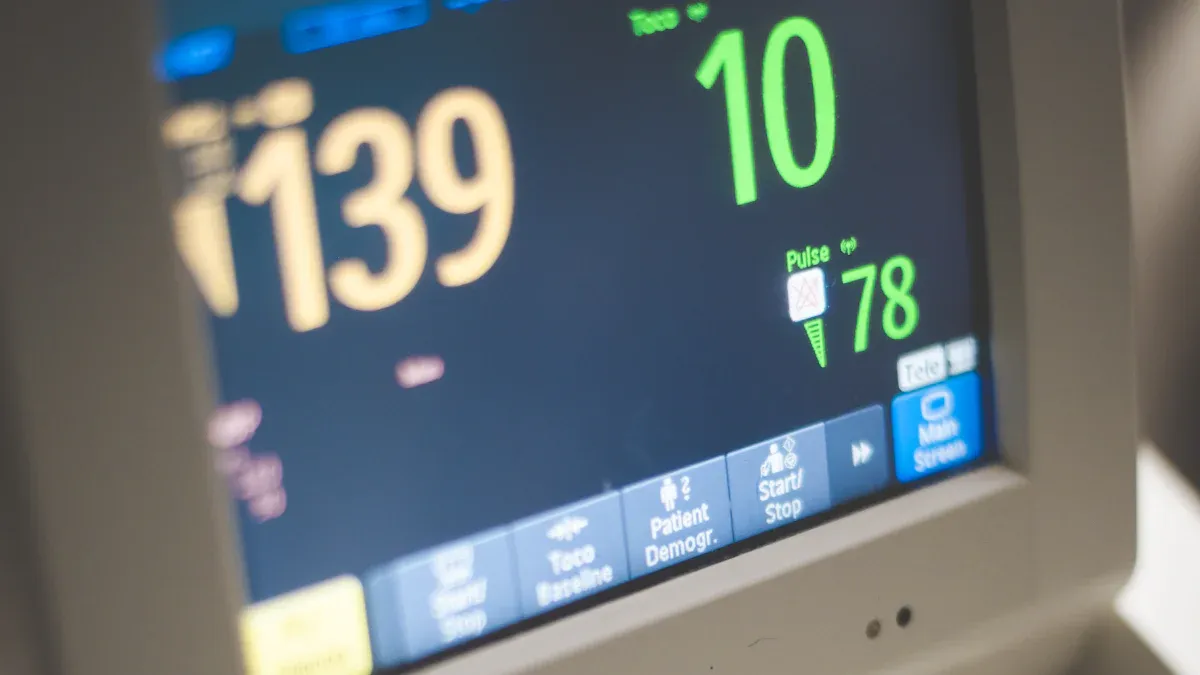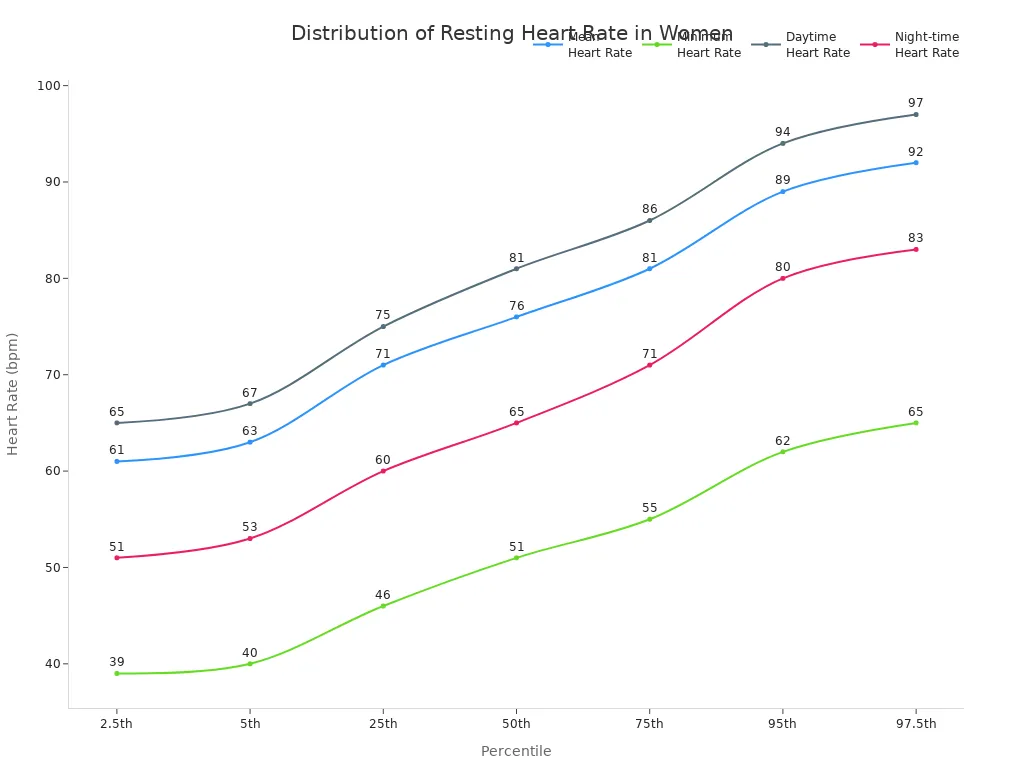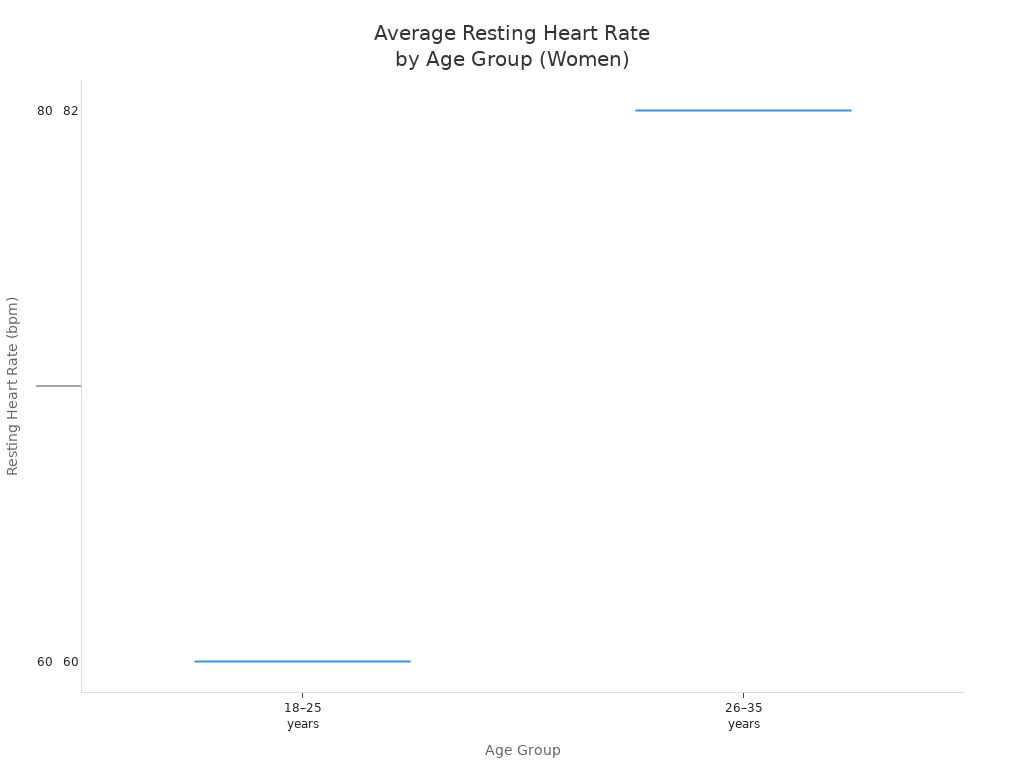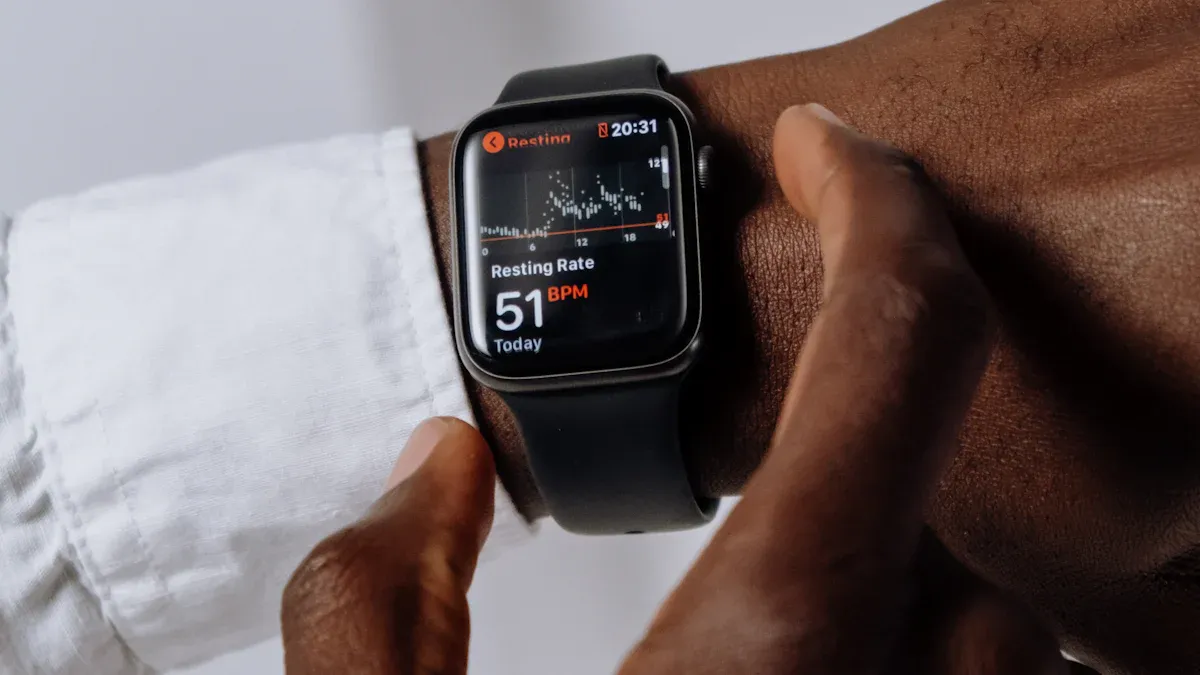
A normal resting heart rate for women usually falls between 60 and 100 beats per minute, with most women averaging 78 to 82 bpm. Research shows that women’s resting heart rate for women tends to run higher than men’s, often by about 4 to 5 bpm. Factors like age, fitness, and daily habits can change your normal resting heart rate. Tracking your resting heart rate for women helps you spot changes that may affect your healthy heart. Modern tools like the VERTU Aura Ring make it simple and accurate to monitor your heart health at any time.
Key Takeaways
-
Most women have a normal resting heart rate between 60 and 100 beats per minute. The average is about 78 to 82 bpm. Your resting heart rate can change as you get older. It also changes with your fitness and hormones. Checking your heart rate often helps you see important changes. You can check your resting heart rate at home. Count your pulse or use smart rings for easy tracking. These devices help you track your heart rate accurately. Healthy habits can help lower your resting heart rate. Exercise, eating well, and managing stress are good for your heart. If your resting heart rate is always too high or too low, tell a doctor. Also, see a doctor if you feel dizzy or have chest pain.
Resting Heart Rate Basics

What It Means
Resting heart rate is the number of times your heart beats each minute when you are calm and not moving. Doctors use this number to check how well your heart works when you are at rest. You can measure your resting heart rate by counting your pulse or using a heart rate monitor while you sit or lie down quietly.
-
You can check your resting heart rate at home by feeling your pulse on your wrist or neck.
-
Doctors may also use tools like ECG machines or 24-hour monitors in clinics.
-
Self-measured resting heart rate is reliable and matches well with results from medical equipment.
Your resting heart rate is controlled by your body’s nervous system. The autonomic nervous system has two parts: the sympathetic system, which speeds up your heart, and the parasympathetic system, which slows it down. The balance between these systems keeps your heart rate steady. Other things like age, fitness, and even the weather can change your resting heart rate.
Tip: Your resting heart rate can change from day to day. Checking it at the same time each morning gives you the best results.
Why It Matters
Resting heart rate is a key sign of your heart’s health. Most healthy women have a resting heart rate between 60 and 100 beats per minute. If your resting heart rate is lower, it often means your heart is strong and pumps blood well. Athletes and people who exercise often may have a lower resting heart rate, which is normal for them.
A resting heart rate that is too high or too low can signal health problems. If your resting heart rate stays above 100 beats per minute, you should talk to a doctor. A very low resting heart rate, below 60 beats per minute, can also be a concern unless you are very fit.
-
Your resting heart rate can change with age, fitness, and hormones.
-
Sudden changes or very high or low numbers may mean you need a health check.
Note: Always pay attention to how you feel. If you notice dizziness, chest pain, or shortness of breath along with changes in your resting heart rate, seek medical advice.
Normal Ranges for Resting Heart Rate for Women
General Range and Averages
You might wonder what counts as a normal resting heart rate for women. Doctors and health experts agree that for most women aged 15 and older, a normal resting heart rate falls between 60 and 100 beats per minute (bpm). This range comes from clinical guidelines used around the world. The table below shows how this range changes as you grow:
|
Age Group |
Normal Resting Heart Rate (bpm) |
|---|---|
|
Newborn |
100-160 |
|
0-3 months |
70-170 |
|
6-12 months |
80-140 |
|
1-3 years |
80-130 |
|
3-5 years |
80-120 |
|
6-10 years |
70-110 |
|
11-14 years |
60-105 |
|
15 years and older |
60-100 |
Most adult women have an average resting heart rate between 78 and 82 bpm. This is a bit higher than men, who usually have a lower resting heart rate. The difference comes from the size of the heart and how it works. Women’s hearts are smaller, so they beat a little faster to pump enough blood. If you check your resting heart rate for women, you will likely find it in this range.
A study of over 2,000 healthy women showed how resting heart rate values spread out in the population. The chart below shows the mean, minimum, daytime, and night-time heart rates for women at different percentiles:

Most healthy women have a resting heart rate between 61 and 89 bpm, with the average near 76 bpm. Your heart rate may be higher during the day and lower at night.
By Age and Fitness
Your resting heart rate for women changes as you age. Younger women often have a lower resting heart rate, while older women may see their heart rate rise. The table below shows the average resting heart rates for women by age group:
|
Age Group |
Average Resting Heart Rate Range (bpm) |
|---|---|
|
18–25 years |
60 to 80 |
|
26–35 years |
60 to 82 |
|
36–45 years |
62 to 84 |
|
46–55 years |
64 to 86 |
|
56–65 years |
65 to 88 |
|
65+ years |
66 to 90 |

Physical fitness also plays a big role. If you exercise often, your heart gets stronger and pumps blood more easily. This means you may have a low resting heart rate, sometimes as low as 54-60 bpm if you are an athlete. Women who do not exercise much may have a higher resting heart rate, sometimes over 85 bpm. Tracking your resting heart rate for women can help you see how your fitness changes over time.
If you notice your resting heart rate dropping as you get fitter, that is a good sign. A lower resting heart rate often means your heart is healthy and strong.
When It’s Too High or Low
Sometimes, your resting heart rate for women can fall outside the normal range. A low resting heart rate, called bradycardia, means your heart beats fewer than 60 times per minute. This can be normal if you are very fit, but it can also signal a problem if you feel dizzy, tired, or faint. Causes of low resting heart rate include heart disease, thyroid problems, certain medicines, or even sleep apnea.
A high resting heart rate, called tachycardia, means your heart beats more than 100 times per minute while you are at rest. This can happen if you are stressed, sick, have a fever, or use caffeine or some medicines. Sometimes, a high resting heart rate can point to heart problems or other health issues.
-
Common causes of low resting heart rate:
-
Heart diseases (like heart block or heart failure)
-
Thyroid problems
-
Certain medications (such as beta-blockers)
-
Sleep apnea
-
Inflammatory diseases
-
-
Common causes of high resting heart rate:
-
Fever or infection
-
Stress or anxiety
-
Too much caffeine or alcohol
-
Some medications
-
Heart conditions
-
If your resting heart rate for women stays above 100 bpm or below 60 bpm and you feel unwell, talk to your doctor. Always pay attention to how you feel, not just the number.
A healthy heart rate helps you live well and stay active. Knowing your normal resting heart rate and watching for changes can help you spot problems early.
Influencing Factors
Modifiable Factors
You can change many things in your life to help control your resting heart rate. These are called modifiable factors. Making healthy choices can help you keep your heart strong and steady.
-
Physical activity: Regular exercise, like walking, running, or yoga, makes your heart stronger. A strong heart pumps blood better and lowers your resting heart rate.
-
Body weight: Keeping a healthy weight helps your heart work less. If your body mass index (BMI) is high, your heart may beat faster to move blood around your body.
-
Smoking and alcohol: Smoking and drinking alcohol can raise your resting heart rate. Quitting smoking and limiting alcohol helps your heart stay healthy.
-
Diet and hydration: Eating a balanced diet supports your heart. Drinking enough water each day, about 2.7 liters for women, keeps your blood thin and easy to pump. Dehydration can make your heart beat faster.
-
Stress management: Stress can make your heart race. Using relaxation techniques like deep breathing, meditation, or mindfulness can lower your resting heart rate.
-
Stimulants: Caffeine and some medicines can increase your heart rate. Try to limit these if you notice your heart beating faster.
Tip: If you see your resting heart rate going up over time, it may mean you need to make healthier choices.
Non-Modifiable Factors
Some things that affect your resting heart rate are out of your control. These are called non-modifiable factors.
-
Age: As you get older, your resting heart rate may change. Older adults often have a slightly higher heart rate.
-
Genetics: Your genes play a small role in how fast your heart beats. Some people are born with a naturally higher or lower resting heart rate.
-
Sex and hormones: Women usually have a higher resting heart rate than men. Hormones like estrogen help slow the heart rate, especially before menopause. After menopause, lower estrogen can cause your heart rate to rise.
-
Body shape: If you have more fat around your waist, your heart may beat faster. This is because your body needs more effort to move blood.
|
Age Group |
|
|---|---|
|
Adolescents (13-18 years) |
60 to 100 |
|
Adults (all ages) |
60 to 100 (lower in fit adults) |
Knowing which factors you can change helps you work toward a healthy heart rate. Some things, like age and genetics, you cannot change, but you can still take steps to support your heart.
How to Measure

At Home Steps
You can measure your resting heart rate at home with simple tools. The best time to check is in the morning before you get out of bed. Make sure you are calm and not stressed.
-
Sit or lie down and relax for a few minutes.
-
Place your index and middle fingers on your wrist, just below the thumb (radial artery), or on the side of your neck, just below your jawbone (carotid artery).
-
Press gently until you feel your pulse. Do not use your thumb, as it has its own pulse.
-
Multiply that number by 4 to get your beats per minute.
Tip: Always measure your resting heart rate under the same conditions. Factors like body position, caffeine, and medications can change your results.
You can also use digital fitness trackers, blood pressure monitors, or smartphone apps. Manual counting is often very accurate, but devices can make tracking easier.
Using Smart Rings
Smart rings like the VERTU Aura Ring offer a new way to track your resting heart rate. The Aura Ring uses advanced sensors inside a comfortable, stylish ring. These sensors measure your heart rate, heart rate variability, and other health signals all day and night. The ring sends this data to an app, where you can see easy-to-understand charts and tips.
Continuous monitoring gives you more than just a single number. You can spot trends, track changes, and get alerts if your heart rate goes too high or low. Many women use smart rings to watch for stress, sleep quality, and even fertility patterns. The Aura Ring feels natural to wear and provides insights that help you take charge of your health.
Smart rings make it simple to know your resting heart rate and understand your body better every day.
When to Seek Help
Warning Signs
It is important to know when your heart needs help. Your body can give you hints if something is wrong. Watch out for these signs:
-
Your resting heart rate stays over 120 bpm or drops under 50 bpm (unless you are an athlete)
-
Your heart beats in an odd way, especially with other problems
-
You feel pain, tightness, or pressure in your chest
-
You have trouble breathing, even when you are not moving
-
You feel dizzy or lightheaded
-
You faint or almost faint
-
You feel very tired or weak for no reason
-
You feel confused or cannot focus
-
You cannot do your normal daily activities
🚩 If you have chest pain, pain in your jaw, arm, neck, or back, or you cannot breathe well, this is an emergency.
If you ignore these signs, you could get very sick. A strange resting heart rate that does not go away can raise your risk of stroke, heart failure, or other serious problems. Always pay attention to your body and take these signs seriously.
When to Call a Doctor
Call your doctor if your resting heart rate is often over 100 bpm for no clear reason. Get help if your heart rate feels strange or changes a lot each day. You should also talk to a doctor if you notice:
-
Your heart pounds for more than a few minutes
-
You feel dizzy, faint, or weak
-
You have pain or pressure in your chest
-
You have trouble breathing
-
You feel pain in your neck, arms, back, jaw, or stomach
Smart rings and other devices can help you watch your heart rate and spot changes early. Finding problems early and getting treatment can lower your risk of heart failure, stroke, and other bad health problems. Do not ignore strange symptoms or numbers. Your doctor can help you find out what is wrong and keep your heart healthy.
Your resting heart rate usually falls between 60 and 100 beats per minute, but age, fitness, and hormones can shift this range. Regularly checking your resting heart rate helps you spot changes early. Smart rings like the Aura Ring make tracking simple and offer insights into your heart health.
If you notice your heart rate stays too high or low, or you feel dizzy or weak, talk to your healthcare provider.
FAQ
What is the best time to check my resting heart rate?
You get the most accurate reading in the morning before you get out of bed. Your body is calm, and you have not moved much yet.
Can stress affect my resting heart rate?
Yes, stress can make your heart beat faster. You may notice a higher resting heart rate during stressful times. Try deep breathing or meditation to help lower it.
How does the Aura Ring measure my heart rate?
The Aura Ring uses tiny sensors inside the ring. These sensors track your pulse and send the data to an app. You see your heart rate and trends in easy-to-read charts.
Is a low resting heart rate always healthy?
A low resting heart rate can mean your heart is strong, especially if you exercise often. If you feel dizzy, weak, or faint, you should talk to your doctor.
Can I use a smart ring if I have a heart condition?
You can use a smart ring to track your heart rate. Always share your results with your doctor. The ring helps you notice changes, but your doctor gives you medical advice.







